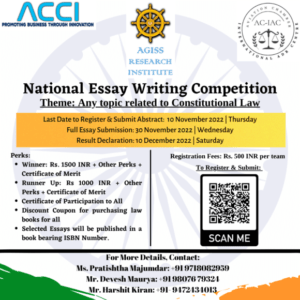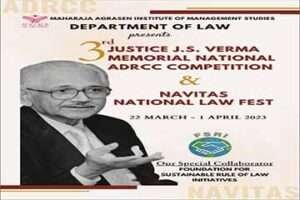9Th Cartal Conference on International Arbitration, 2025
About the Institution
National Law University, Jodhpur [“NLUJ“] is one of India’s premier law schools established under the National Law University, Jodhpur Act, 1999 legislated by the State Government of Rajasthan. Nestled in the culturally vibrant city of Jodhpur, the Blue City, NLUJ is committed to advancing knowledge and learning, furthering its vision to become a centre for excellence in legal studies.
About the Conference
The 9th CARTAL Conference on International Arbitration, 2025 organised by the Centre for Advanced Research and Training in Arbitration Law [“CARTAL“] is being conducted in a paper presentation and panel discussion format in collaboration with Jus Mundi and Kluwer Arbitration as our knowledge partners, and SCC Times as our exclusive media partner.
Previously, the Conference has hosted prominent luminaries in the sphere of arbitration such as Hon’ble Mr. Justice B. N. Srikrishna (Former Judge, Supreme Court of India), Hon’ble Mr. Justice Madan B. Lokur (Judge, Supreme Court of Fiji), Prof. Marike Paulsson (Director, University of Miami School of Law’s International Arbitration Institute), Prof. (Dr.) Petra Butler (Dean of Law at the University of Canterbury), and many more. The Conference has, in the past, been conducted in association with Baker McKenzie, Linklaters, and the SAARC Arbitration Council, besides other institutional partners. The foregoing editions witnessed a plethora of guest speakers from notable firms and arbitral institutions such as Afridi & Angell, Al Tamimi & Co., Clifford Chance, Homburger, Hughes Hubbard & Reed, Linklaters, King & Spalding, and King & Wood Mallesons, to name a few. The conference aims to provide students with a comprehensive understanding of the principles and practices of international arbitration, blending theoretical knowledge with practical insights from leading experts in the field.
About CARTAL
CARTAL was established by National Law University, Jodhpur to advance research and scholarship in the specialized legal domain of arbitration law. The Centre aims to equip students with both theoretical and practical knowledge of arbitration by creating a platform where academicians, professionals, and students can engage in discussions on contemporary arbitration law issues. In furtherance of its mandate, the Centre organizes workshops, conferences, and guest lectures that enhance the understanding of these topics. Additionally, the Centre publishes the Indian Journal of Arbitration Law [“IJAL“] bi-annually.
About IJAL
IJAL is a bi-annual, open-access and double-blind peer reviewed publication, recognised widely as a prominent source of literature on dispute resolution, with a focus on transnational debates as regards to international commercial arbitration and investment treaty arbitration. The Journal has successfully published twelve volumes, regularly hosting contributions from globally renowned experts, and is indexed on HeinOnline, Kluwer Arbitration, Westlaw as well as SCC Online. The articles published in IJAL have, inter alia, been referred to in the Report of the High-Level Committee to Review Institutionalization of Arbitration Mechanism in India constituted under the chairmanship of Justice B.N. Srikrishna, Federal Court of Australia’s website, Submission of the European Federation for Investment Law and Arbitration to the UNCITRAL Working Group No. III on ISDS Reforms, UN Secretariat’s note on Bibliography of recent writings related to the work of UNCITRAL, ICC Digital Library. Additionally, IJAL has been cited in Nakul Dewan’s “Enforcing Arbitral Awards in India,” Jan Paulsson and Georgios Petrochilos’ “UNCITRAL Arbitration,” Anselmo Reyes and Weixia Gu’s “The Developing World of Arbitration: A Comparative Study of Arbitration Reform in the Asia Pacific,” and several other noteworthy works.
Themes
Paper Presentation and Panel Discussion segments of the Conference would bring diverse perspectives to the subject matter, while also considering a wide range of issues related to arbitration. The deliberations would be contemporary and relevant. The themes for this year’s conference are as follows:
I. Revolutionizing Arbitration with Emerging Technologies
Emerging technologies like AI, blockchain, and virtual platforms are transforming arbitration, significantly enhancing efficiency, cost-effectiveness, and accessibility in resolving disputes. AI streamlines case management, accelerates document review, and predicts outcomes with remarkable accuracy, while blockchain ensures secure, tamper-proof records and enables self-executing smart contracts. Virtual hearings reduce costs and expand global access but raise concerns about cybersecurity, unequal access to technology, and the potential loss of interpersonal dynamics. However, these advancements also pose challenges, including issues of transparency, algorithmic bias, and the rigidity of automated systems in nuanced cases. Ensuring that technology complements, rather than compromises, fairness, impartiality, and procedural integrity in arbitration requires robust regulatory frameworks. Striking this delicate balance is essential to harnessing technological innovation for effective, and equitable dispute resolution globally.
II. Institutional Arbitration: Navigating Legal Frameworks and Enhancing Procedural Efficiency
Institutional arbitration offers a structured approach to dispute resolution, supported by established rules and administrative frameworks. However, navigating these frameworks often presents challenges, including jurisdictional conflicts, complex procedural requirements, and varying enforcement standards across jurisdictions. These issues can deter parties seeking swift and efficient resolution. Institutions play a pivotal role in enhancing procedural efficiency through case management services, expedited timelines, and specialized panels. Yet, achieving uniformity in practices while respecting regional legal frameworks remains a significant hurdle. The growing need for harmonization highlights the importance of institutions adapting to evolving commercial realities and fostering greater accessibility and consistency. Balancing procedural rigor with efficiency is essential to ensuring institutional arbitration remains a trusted mechanism for global dispute resolution.
Eligibility
We welcome all students, academicians, and practitioners to attend the Conference.
Registration Fees
The following registration fee is payable in sum for attending both the paper presentation and panel discussion segments of the Conference.
a. Academicians/Practitioners/Professionals: INR 3000/- only (per person)
b. Students/Ph.D. Research Scholars: INR 2000/- (per person)
Please note this fee payable would be adjusted towards the accommodation, meals, and conference participation costs. The Participants must bear their individual travel expenses. However, the Conveyance from the accommodation to the University would be provided for.
How to participate?
Interested attendees may showcase their interest in participation by filling out the form, available here.
All attendees will be presented with certificates of participation and will be invited to a networking dinner.
Deadline
- Closing date of registration: March 07, 2025
- Conference dates: March 22 – 23, 2025
Contact
In case of any queries, you may contact us at ijal@nlujodhpur.ac.in or alternatively at +91 8454867872.
Further details are provided in the attached brochure




